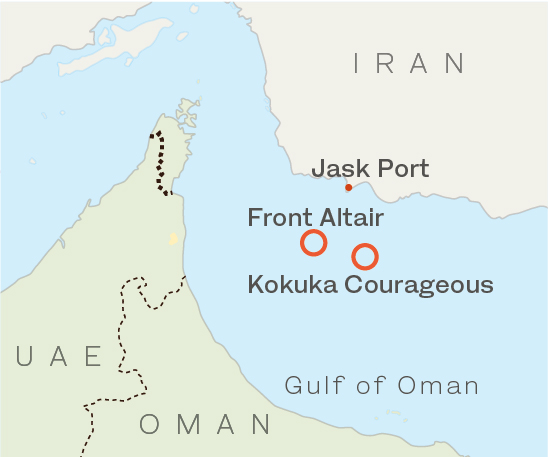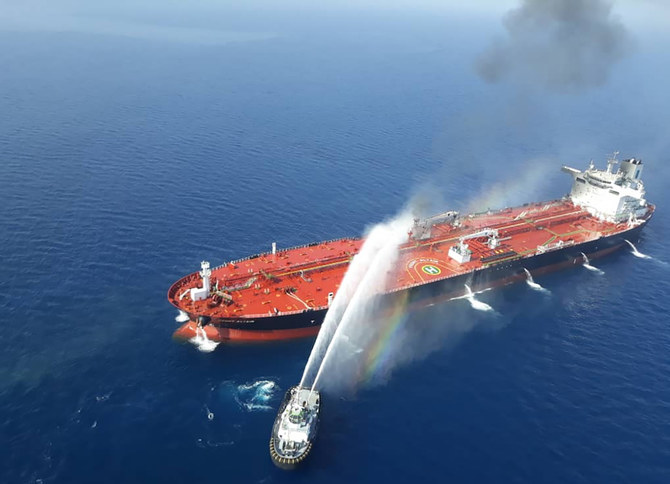LONDON: Saudi Arabia said it agrees with the US blaming Iran for attacks on two tankers in the Gulf of Oman as the Americans produced a video on Thursday showing the removal of a mine from the side of one of the ships by the Iranian Revolutionary Guard Corp (IRGC).
US Central Command spokesman Bill Urban released a video of what the US military said was an IRGC Gashti Class patrol boat approaching the ship Kokuka Courageous “and was observed and recorded removing (an) unexploded limpet mine from the M/T Kokuka Courageous.”
The attacks on the ships are part of a “campaign” of “escalating tension” by Iran and a threat to international peace and security, US Secretary of State Mike Pompeo said.
“It is the assessment of the United States government that the Islamic Republic of Iran is responsible for the attacks that occurred in the Gulf of Oman today,” Pompeo said. “This assessment is based on intelligence, the weapons used, the level of expertise needed to execute the operation, recent similar Iranian attacks on shipping, and the fact that no proxy group operating in the area has the resources and proficiency to act with such a high degree of sophistication.”
#BREAKING: US Secretary of State Mike Pompeo: Iran is behind the attack on the oil tankers in the #GulfOfOman https://t.co/TgG1cFjlI0 pic.twitter.com/VzjQdpSvbb
— Arab News (@arabnews) June 13, 2019
“We have no reason to disagree with the secretary of state. We agree with him,” Saudi Foreign Minister Adel Al-Jubeir told CNN. “Iran has a history of doing this.”
The United Arab Emirates said Friday that the twin attacks on tankers in the Gulf of Oman just weeks after four ships were damaged off the UAE coast marked a “dangerous escalation.”
“The attack against the tankers in the Gulf of Oman is a worrying development and a dangerous escalation,” Anwar Gargash, the UAE minister of state for foreign affairs, tweeted after Thursday’s blasts.
الاعتداء اليوم على ناقلات النفط في خليج عمان واستهداف مطار أبها في المملكة العربية السعودية الشقيقة تطور مقلق وتصعيد خطير ويستدعي تحرك المجتمع الدولي لضمان صون الأمن والاستقرار الإقليمي. الحكمة ضرورية والمسؤولية جماعية للحيلولة دون المزيد من التوتر.
— د. أنور قرقاش (@AnwarGargash) June 13, 2019
UK foreign secretary Jeremy Hunt on Friday also said that there is no reason not to believe US assessment that Iran was behind tanker incident.
“We are going to make our own independent assessment, we have our processes to do that, (but) we have no reason not to believe the American assessment and our instinct is to believe it because they are our closest ally,” Hunt told BBC radio on Friday, echoing comments he made late on Thursday.
Meanwhile, China on Friday called for “dialogue” after the United States accused Iran of being behind attacks on two tankers in the Gulf of Oman.
Nobody wants war in the Gulf of Oman, the country’s foreign ministry said.
“We hope that all the relevant sides can properly resolve their differences and resolve the conflict through dialogue and consultations,” said foreign ministry spokesman Geng Shuang at a regular press briefing.
“This conforms with the interests of regional countries, and also conforms with the interests of the international community,” he added.
Also on Thursday, senior US officials said they do not believe the threat from Iran is over.
Speaking on condition of anonymity to discuss the sensitive matter, the officials said the US photographed an unexploded mine on the side of one of the tankers, which led to the assessment that Iran was responsible for the attack. The photograph is expected to be made public later Thursday.
The officials say the US will reevaluate its presence in the region. They advise that a program to provide military escorts of merchant ships under consideration.
Iran’s foreign ministry on Friday dismissed the US accusation that it was behind the attacks on two tankers in the Gulf of Oman as “baseless.”
Responding to the “baseless accusations” of Pompeo, Iran Foreign Ministry spokesman Abbas Mousavi insisted that Iran had come to “help” the ships in distress and “saved” their crew as quick as possible, according to a statement published on his Telegram channel.
The crew of a Japanese-owned tanker hit in an apparent attack in the Gulf of Oman saw a “flying object” before a second blast on board, the operator’s head said Friday. They also saw Iranian naval vessel nearby, he added.
“The crew members are saying that they were hit by a flying object. They saw it with their own eyes,” Yutaka Katada, head of Kokuka Sangyo shipping company, told reporters.
#USNavy responds in the #GulfOfOman as #USSBainbridge answers distress call - https://t.co/nmeWnfycaG pic.twitter.com/Y6WOruIPjb
— U.S. Navy (@USNavy) June 14, 2019
Dr. Theodore Karasik, senior adviser at Gulf State Analytics in Washington, DC, said the leadership in Tehran may be fracturing under economic pressure from the US, with supreme leader Ali Khamenei losing control of the Islamic Revolutionary Guard Corps (IRGC). “Iran is continuing to lash out because of its inability to deal with the sanctions,” he said.
The Front Altair and the Kokuka Courageous were hit by explosions shortly after passing through the Strait of Hormuz. Iran has repeatedly threatened to close the narrow passage at the entrance to the Arabian Gulf, through which about a fifth of the world’s oil supply passes.
In July 2018, two Saudi Arabian oil tankers were attacked in the Bab Al-Mandeb strait at the southern entrance to the Red Sea off the coast of Yemen. The Arab military coalition supporting the Yemeni government blamed the Iran-backed Houthi militia for that attack.
Thursday’s attacks in the Gulf of Oman are a “major escalation,” coalition spokesman Col. Turki Al-Maliki said. “From my perspective ... we can connect it to the Houthi attacks at Bab Al-Mandeb.”
Donald Trump, who has made economic and military pressure against Iran a cornerstone of his foreign policy, was being briefed Thursday about the tanker attack.
-------
READ MORE
Two tanker owners suspend Gulf bookings as tension now ‘as high as it gets’
Tankers attacked with ‘mine and torpedo’ in Gulf of Oman
-------
A US defense official told CBS News “it was “highly likely Iran caused these attacks.”
The official said American authorities are expected to recover sufficient debris from the attacks to trace their source and that any US retaliation would depend on the evidence and on other Gulf countries.
The Arab League Secretary-General Ahmed Aboul Gheit told the UN Security Council: “Some parties in the region are trying to instigate fires in the region and we must be aware of that.”
His comments will be read as reference to Iran, which Arab countries accuse of attempting to destabilize the region, primarily though its proxy forces in Lebanon, Iraq, Syria and Yemen.
Aboul Gheit called on the council to act against those responsible for the attacks to maintain security in the Gulf.
Pressure has been mounting on Tehran from crippling economic sanctions, which have greatly reduced its oil exports, and an increased US military presence in the region.
The attacks were the second in a month near the Strait of Hormuz, a major strategic waterway for world oil supplies.
The United States and Saudi Arabia blamed Iran for last month’s attacks using limpet mines on four tankers moored off the coast of the UAE. Thursday’s attacks against tankers under steam, moving cargo from Arabian Gulf ports in the UAE and Saudi Arabia to international customers, would be an escalation.
Observers believe the attacks on shipping could be Iran attempting to reassert its position.
“We see this as Iran trying to get negotiating leverage it doesn’t have,” Bob McNally, president of the US consultancy Rapidan Energy Group, told Reuters. “I don’t think it tips us over into direct military confrontation. It is still deniable and denied. This is still going to be like the attack last month – everyone is denying it. It’s a blunt message.”
Other international responses offered strong condemnation but urged caution on attributing blame.
Kuwait's Foreign Minister Sheikh Sabah Khaled Al-Sabah described the attacks as a threat to international peace and security.

“This is the most recent event in a series of acts of sabotage that are threatening the security of maritime corridors as well as threatening energy security of the world,” he said.
Acting US Ambassador to the UN Jonathan Cohen said attacks on commercial shipping were “unacceptable” and “raise very serious concerns.”
‘The US government is providing assistance and will continue to assess the situation,” he told the UN Security Council.
UN Secretary-General Antonio Guterres warned at the meeting that the world cannot afford “a major confrontation in the Gulf region.”
“I strongly condemn any attack against civilian vessels. Facts must be established and responsibilities clarified,” he said.
Qatar condemned the attacks "regardless of who was behind them," the state news agency QNA reported. Qatar also called on all parties to show restraint and stop escalation, while calling for an international investigation into the attacks.




























